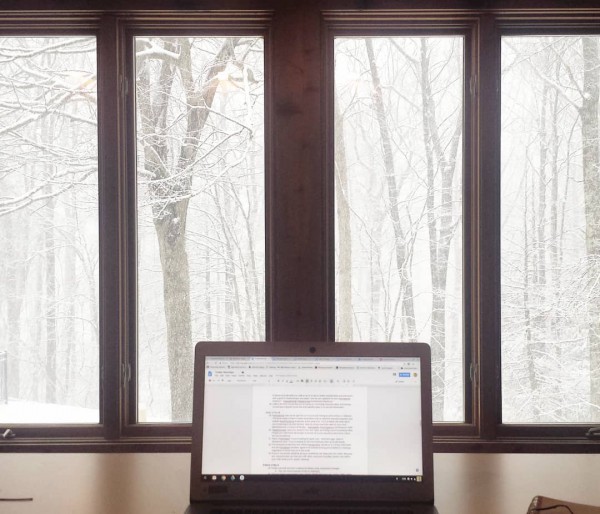
Interview with Laurel about helping companies transition to remote work
How did you get started with remote work?
I like to say that I was a remote worker before it was cool.
About 12 years ago, I became the operations manager for a very small business in Colorado. I was the first employee, so in order to keep overhead expenses low, I offered to work from home like the business owner had been.
We would conduct our work autonomously throughout the day, have weekly meetings to report, and stay in touch via email in between. We lived in the same city, so if we needed to have an in-person meeting with each other or with a client, we would meet at a rented conference room or a cafe.
That industry had a high-season and a low-season, so during the slow months, I reached out to other entrepreneurs and small business to offer administrative assistance with the same work model.
Fast forward a decade and I am still doing the same work on a much larger scale as an operations consultant for remote-friendly companies around the world.
Read 114 answers from other remote workers
What are you working on?
As most freelancers, I have my hands in several cookie jars.
I write remote work education content for leadership training companies like Workplaceless; I advise US state governments with remote work initiatives about how to navigate the virtual work industry; I write articles and presentations about remote work for brands like Yonder, Remote Work Hub, Remote.com, and Re.Now; and I am a distributed business operations consultant for remote-friendly companies around the world.
I like to think that it's the best of both worlds—that I get the independence and flexibility of a freelancer, but the collaboration of corporate environments.
Read 107 answers from other remote workers
What's your typical work routine?
Because I work with multiple clients, my routine is scheduled by week.
Weekday afternoons are blocked for one client, Tuesday and Friday mornings are reserved for another client, etc.
On a daily level, I start my workday around 7:30 catching up on email or doing some content writing at my treadmill desk. I'll take a break around 11:00 for a shower and early lunch, then resume working in my home office until I go pick up my kids from school at 3:00.
After that it's time to focus on my family and personal hobbies. I am a notorious workaholic, so it's important for me to maintain strict office hours to preserve work-life balance.
Read 92 answers from other remote workers
What are the challenges of working on a hybrid remote team?
Most companies that transition to a remote model assume that only the geographic location of the team will change.
But in reality, all tools, collaboration techniques, workflow processes, and even management styles will be impacted.
If the correct measures are taken, the effect of changing will only be positive, but if not, there seem to be three common "killers" of remote work that appear:
- isolation
- burnout
- micromanagement
You can read more in this article that I wrote for Yonder.
Read 4 answers from other remote workers
How do you manage having too much or not enough work?
If a marathon runner neglects to set an appropriate pace based on their level of expertise, they won't know how fast or slow they should be running in order to achieve their goal.
Likewise, if a worker doesn't measure, track, and control their workload, they are likely to be working too much or too little during their office hours.
I personally find it extremely helpful to keep a gantt chart of all of my projects so that I can easily measure and distribute my bandwidth.
Then, each of those projects are broken into benchmark goals that I incorporate into my daily to do lists (that I write a week at a time).
Read 18 answers from other remote workers
Do you have a dedicated space to work?
I work from my home, which is a log cabin buried in the rural woods of Connecticut, USA.
My primary workspace is my sunroom-turned-office that overlooks the trees (and the wildlife living in them), but I often will migrate to other spots throughout the house (such as the dining room, the sofa, or my treadmill desk) depending on my mood and type of work.

Read 93 answers from other remote workers
What tools do you use to stay productive?
Zoom for video calls (the bulk of my day), Asana for task management, Slack for team/community collaboration, and Google Calendar for Scheduling.
Offline, my "portable office" includes my Fitbit for activity tracking and top-of-the-hour reminders (nudge to wrap up meetings), glasses, water bottle, earbuds, wireless mouse, chargers, and my faithful Chromebook.
I keep all of these packed in a bag that I can take anywhere I feel like working from that day (which has included hotels, trains, the library, mountain tops, the gym, or even my kids' school).
Read 108 answers from other remote workers
How do you stay on task?
Because I juggle so many clients and projects at a time, time blocking is crucial for me to keep from feeling overwhelmed or reactive.
I have certain chunks of time set aside each week to work on each project, then try to only work on (or even think about) that project during it's slot.
If I find myself low on motivation or getting distracted during work hours, turning on a french Pandora station (if I don't understand the lyrics, they can't distract me from my train of thought), taking a break to run some errands, or taking a quick walk around my neighborhood usually does the trick.
Read 100 answers from other remote workers
What do you like about remote work?
So, so many things.
But on a personal note, I appreciate that remote work empowers workers to choose an environment that inspires them best. Early in my career, I was an interior designer, so I have a deep appreciation for the psychological impact that our surroundings have on our behavior.
The ability to choose and control our environment can have a profound impact on our productivity and creativity, which in turn can propel our careers and businesses forward at an unprecedented rate.

Read 106 answers from other remote workers
What do you not like about remote work?
That so many workers are using location flexibility as an excuse to avoid work.
I have reviewed thousands of job applications in which the candidate says they want a virtual role just because they crave the freedom to travel, want the flexibility of working less hours, or feel the entitlement of not having to report to a boss. It is these attitudes that create the perception that remote workers are lazy and untrustworthy - because the perks of the job are being valued more than the job itself.
Too many people fail to remember that remote work is still work.
No one can build a business or a career without grit.
The remote workers that prove the stigma wrong are those that capitalize on location independence to fuel productivity, spark creativity, and maintain better work-life balance (which, in turn, enhances their job performance).
Flexibility and independence aren't the substitute for hard work, they are the reward for it.
Read 103 answers from other remote workers
Why does remote work require discipline?
In a corporate environment, managers provide more than just project supervision. They offer professional development advice, track accomplishments, and collaborate to set goals for the members of their team.
When we work independently, all of those responsibilities are now up to us.
If we only manage our professional lives with calendars and to do lists, we're neglecting the leadership that our careers need, which can lead to isolation, wage gaps, and imposter syndrome.
It is crucial that remote workers get equipped with the tools and strategies that are needed to effectively manage themselves not only logistically, but also professionally, emotionally, and mentally.
Read 6 answers from other remote workers
What did we forget to ask Laurel Farrer?
At RemoteHabits we're always trying to improve our interviews, what question should we have asked Laurel Farrer?
Biography
Laurel Farrer
Laurel Farrer is a Distributed Operations Consultant that collaborates with the world's top remote-friendly companies to strengthen virtual communication, streamline digital processes, and develop long-distance management strategies.
She also writes about remote work for several online publications and education platforms, and advises US governments, business conferences, and industry associations on how to share remote work resources with their audiences to stimulate economic growth.
Work remotely? Share your story on RemoteHabits!
Want to be interviewed? If you have a remote position, head over to the interview me page!
Looking for a remote job?
RemoteHabits Jobs has everything you need to find your next great remote work position!
Related Interviews
Interview with Stefan, a founder building a location-independent startup
Stefan now has total control over his time since leaving the traditional office in early 2019. Hear how his routine is helping him build a solid remote startup.
Interview with Ben, a CEO/Engineer who works remotely
Ben is a CEO/Engineer who works remotely - find out how he balances working at home and family life!
Interview with Kati, a co-founder shares her tips for juggling multiple side hustles
Kati has made a career at using the internet and gig economy to her advantage—see how she successfully manages multiple side hustles and a business.


